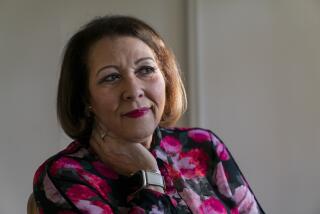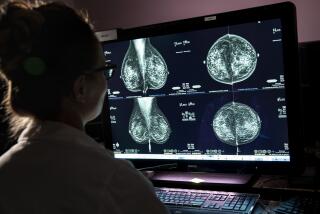Mammogram anxiety could have a good side

- Share via
Mammograms might be helpful. Even for women in their 40s. But maybe not every year. Even for those in their 50s. Got it now?
No. Women are entirely confused, though researchers raise legitimate issues about the value of annual mammograms, especially under age 50 — unless there’s reason for a woman to think she is at higher risk. It’s far from clear that annual mammograms do more good than harm for most women, especially because of the higher number of false positives at younger ages. Unnecessary surgical biopsies aren’t high-risk procedures, but certainly it would be nice to avoid them — if we could do that with any certainty. Most women would probably rather take the risks of the biopsy over the risk of doing nothing about an off finding from mammography.
The newest research, although interesting, casts what might be a less-than-useful light on the emotional part of false positives. A Danish study found that even months after receiving the news that they were fine, women who had gone through the anxiety of a false positive on the mammogram remained very anxious. And though the effect faded with time, some of that feeling remained with them even three years later.
“When I became a doctor and I took the Hippocratic Oath, I said, ‘Do no harm,’” said John Broderman, the University of Copenhagen physician-researcher who led the study. “But this is harm.”
That sounds like a bit of oversimplification. We don’t live without harm, and our lives are often a series of choices about what does the most good and the least harm. Harm-free decisions would make life simpler, but they’re in short supply.
I also wonder whether there isn’t another way to look at that anxiety. In modern times and developed countries, we don’t often confront our own mortality. A cancer scare forces that confrontation, even when we know we now have more time than we had feared. And though a life free of health problems would be great, it’s not a terrible thing to get the jolt that makes us think about our mortality, whether we’re living the way we should and how we will deal with death when that day comes.
I’m open to the thought that we might do a lot more mammograms in this country than we should. But this strikes me as a flimsy reason to change. Perhaps the real problem here is our societal failure to recognize the reality of death and help individuals do the same. We tend to think that if the medical news is good, the patient should go on happily from there, unscarred in spirit, but maybe this lingering anxiety is a potentially valuable sign of thinking profoundly about our limited time on Earth. And it might not be quite as anxiety-producing if we were having more conversations about it as a society — or at least if these patients didn’t feel so alone with their weighty thoughts.
ALSO:
Give online courses the old college try
More to Read
A cure for the common opinion
Get thought-provoking perspectives with our weekly newsletter.
You may occasionally receive promotional content from the Los Angeles Times.











